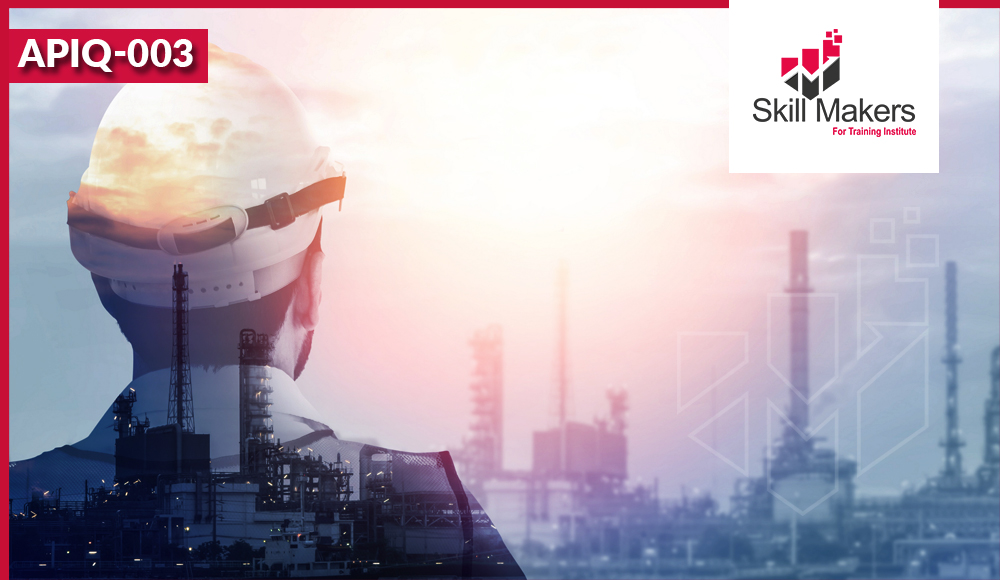-
Course Code
APIQ-003

API 653 Aboveground Tank Inspector Certification Examination Preparatory
- Progressive corrosion deteriorates pressure retaining walls to such an extent that there is always a threat of major break down which may lead to fire or some time to explosion. To avoid such accidents API has developed systematic ways to carry out ‘In-service Inspection’ to determine rate of corrosion and the remaining life of the equipment and piping.
Learning Outcomes
- The API initiated the Aboveground Storage Tank Inspector certification program to provide a continued high level of safety using Inspectors specialized in Aboveground Storage Tanks. The program promotes self-regulation, establishing a uniform standard that will assist national, regional and local governments in setting Aboveground Storage Tanks regulations.
- This course will prepare an Inspector to successfully complete the API 653 Authorized Aboveground Tank Inspector Certification Examination by thoroughly reviewing the API 653 Standard, APT 571, API 575, API 577, API 651, API 652 and the ASME Boiler and Pressure Vessel Code Sections V and IX. Mock examination questions, meeting the appropriate specific examination criteria, will be utilized to simulate actual API test conditions, providing an effective study base.
Course Contents
- Introduction
- API 653: Examination Scheme
- Question Types
- API 650 Design Aspects
- Design temperature
- Tank Materials
- Impact Testing of Materials
- Weld sizes for shell and roof openings
- Bottom & roof design
- Fabrication requirements
- Inspection requirements
- Extent of Radiography
- Introduction to API 653 – Sec. 1
- Points to Recall-Day 1
- Review of Quiz-Day 1
- Introduction to API 653
- Existing tank shell thickness evaluation
- Evaluation of pitting
- Evaluating of corrosion on bottom plates
- Foundation evaluation
- API 653 – Sec. 5 Brittle fracture
- Inspection frequency (routine inspection)
- External Inspection
- Internal Inspection
- Inspection Intervals
- Inspection Records
- API 653 – Sec. 7
- API 653 – Sec. 8
- API 653 – Sec. 9
- Tank repair and alteration
- Review Quiz -Day 2
- Repair of Tank Bottom
- API 653 – Sec. 10
- Dismantling and reconstruction
- API 653 – Sec 11
- Welding
- API 653 – Sec. 12 Examination & Testing
- API 653 – Sec. 13
- API 653 – App. B
- Evaluation of Tank Bottom Settlement
- Reports & Records
- API RP 575
- Types of Tanks
- Procedures and evaluations of internal and external inspection
- Evaluation of change of service
- Evaluation of flaws and distortions
- API RP 651
- Cathodic Protection Requirement
- Methods of Cathodic Protection
- ASME Sec. V – NDT
- RT Examination
- ASME Sec. V – NDT
- Magnetic Particle
- UT Examination
- ASME Sec. IX
- Welding Qualifications
- WPS/PQR
- Review of WPS/PQR documents
- Road map for document review
- Case studies in WPS/PQR
- Tank Bottom Lining
- Types of linings
- Selection and Application of Linings
- Damage Mechanisms
- API 571
- Degradation mechanisms
- API 577
- Welding, NDT and metallurgy
- Final Simulated Test (Open Book)
- Test Feedback
- Final Simulated Test (Close Book)
- Test Feedback
Our Methodology
- Make coaching and monitoring innovative and using modern
- Media training also using on the go training by using interactive means and focusing on
- The exercises, practical applications and real situations study
- Live delivery method, instructor-led training
- Experienced consultant, trainers, and professional
- Qualified trainer with high-level experience
Attendance Reports
- Send daily attendance reports to training departments
- Send full attendance report to training dep. by the end of the course
- Attend 100 % from the course days also provide daily
- Issue attendance certificate for participant who attend minimum 80% from the course duration
Pre/Post Reports
- Pre- assessment before starting training
- Post assessment after finish training
- Full report for the deferent between Pre-& Post assessment
Who Should Attend
- The course is tailored for Engineers, Supervisors
- Managers and personnel who are interested in the API 510 program and who wish to present themselves for the Pressure Vessel Inspector Certification examination.
